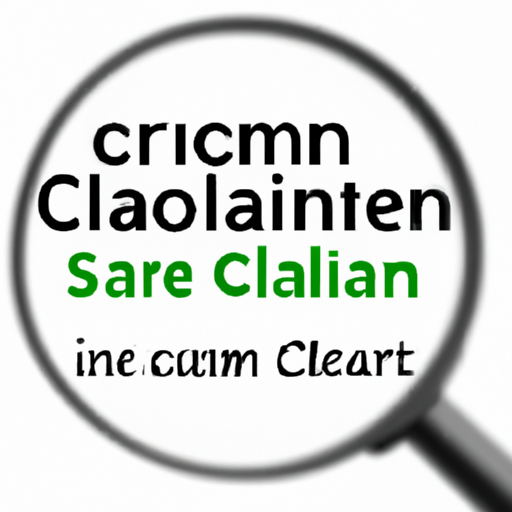In today’s highly competitive marketplace, businesses are constantly vying for the attention of consumers. One strategy that is often employed is the use of exaggerated product claims. These claims, while enticing, can sometimes cross legal boundaries and lead to litigation. As a business owner, it is crucial to understand the potential pitfalls associated with making exaggerated claims about your products or services. In this article, we will explore the legal implications of exaggerated product claims, provide insights on how to navigate this complex area of law, and discuss why it is essential to consult with a knowledgeable attorney to protect your business’ interests.
Exaggerated Product Claims
Exaggerated product claims have become increasingly common in the business world. These claims can have serious legal implications and can lead to significant consumer repercussions. As a business owner, it is crucial to understand the potential consequences of making exaggerated claims about your products and take steps to protect your business.

Understanding Exaggerated Product Claims
Exaggerated product claims refer to the practice of overpromising or misrepresenting the benefits or qualities of a product. This can include statements about the product’s performance, effectiveness, or results that are not supported by scientific evidence or are intentionally exaggerated to attract consumers. While businesses may employ such claims to gain a competitive edge or increase sales, they can face legal challenges for deceptive advertising practices.
Legal Implications of Exaggerated Claims
Making exaggerated product claims can leave your business vulnerable to legal consequences. False advertising laws exist to protect consumers and ensure fair competition in the marketplace. Violating these laws can result in substantial penalties, including fines, injunctions, and damages. Consumers who believe they have been misled by exaggerated claims may also file lawsuits seeking compensation for any harm or losses they have suffered.
Regulatory Agencies and Exaggerated Claims
Multiple regulatory agencies play a significant role in regulating exaggerated product claims. For instance, the Federal Trade Commission (FTC) is responsible for enforcing federal laws against deceptive advertising. The Food and Drug Administration (FDA) oversees claims made by businesses in the health and wellness industry. Compliance with the regulations set forth by these agencies is crucial to avoid potential legal issues.
Common Types of Exaggerated Claims
Exaggerated product claims can take various forms, and it is important to be aware of them. Some common types of exaggerated claims include:
- “Miracle” Claims: Claims that a product can deliver exceptional or miraculous results.
- Unrealistic Weight Loss Claims: Claims that a product can lead to rapid or effortless weight loss.
- Guaranteed Results Claims: Claims that a product will always deliver specific results.
- Endorsement Overstatements: Misleading endorsements or testimonials that exaggerate the benefits of a product.
- Scientific Misrepresentations: False or misrepresented scientific evidence to support a product’s effectiveness.
Signs of Exaggerated Product Claims
As a consumer, it is essential to recognize the signs of exaggerated product claims to make informed purchasing decisions. Some signs that a claim may be exaggerated include:
- Unrealistic Promises: Claims that sound too good to be true or promise extraordinary results.
- Lack of Supporting Evidence: Claims that are not backed by scientific studies, research, or credible sources.
- Vague Statements: Claims that are intentionally vague or use ambiguous language to avoid making concrete promises.
- Excessive Use of Superlatives: Claims that heavily rely on exaggerated language like “best,” “only,” or “most effective.”
Consumer Repercussions of Exaggerated Claims
Consumers who fall victim to exaggerated product claims can suffer various repercussions. These consequences may include financial losses, wasted time and effort, disappointment, and even harm if the product poses health risks. Misleading claims can erode consumer trust in a brand, leading to a negative reputation and loss of customer loyalty.

Protecting Your Business from Exaggerated Claims
To safeguard your business from exaggerated claims, it is crucial to adopt a proactive approach. Consider the following steps:
- Ensure Truthful and Substantiated Claims: Before making any product claims, thoroughly research and ensure they are truthful, accurate, and can be substantiated with scientific evidence or independent studies.
- Review Advertising Materials: Regularly review your advertising materials, including websites, social media posts, packaging, and labels, to ensure they do not contain misleading or exaggerated claims.
- Seek Legal Advice: Consult with a lawyer who specializes in advertising and marketing law to review your marketing strategies, claims, and materials to ensure compliance with applicable regulations.
Legal Remedies for Exaggerated Claims
If your business faces legal action due to exaggerated claims, it is crucial to understand the legal remedies available. These may include:
- Corrective Advertising: A court may require the business to engage in corrective advertising to rectify any misleading claims and inform consumers of the truth.
- Injunctions: A court may issue an injunction to stop the business from making further exaggerated claims or engaging in deceptive advertising practices.
- Damages: Consumers who have been harmed by false or exaggerated claims may seek compensation for their losses, including refunds, financial damages, or reimbursement for medical expenses.

Case Studies on Exaggerated Product Claims
Examining case studies involving exaggerated product claims can provide valuable insights into the potential legal consequences. Here are a few examples:
- XYZ Weight Loss Supplements: The FTC filed a lawsuit against XYZ supplements for making false claims of rapid weight loss without any scientific evidence to back them. The company faced substantial fines and was required to offer refunds to affected consumers.
- ABC Miracle Cream: A skincare company was sued for claiming that their cream could eliminate wrinkles overnight. The court deemed the claim deceptive, and the company was ordered to cease the misleading marketing and pay damages to affected consumers.
- ZZZ Cleaning Products: ZZZ faced legal action after their cleaning products failed to deliver the promised “100% germ-free” environment. The court ordered the company to modify their claims and provide accurate lab reports to support their efficacy.
Frequently Asked Questions
-
Q: What should I do if my competitor is making exaggerated claims about their product? A: Gather evidence of the false claims and consult with a lawyer who specializes in advertising law to discuss potential legal actions you can take.
-
Q: Can I use hyperbole in my marketing without facing legal consequences? A: While hyperbole is sometimes acceptable in marketing, it should not cross the line into making false or misleading claims. Always ensure that your statements are truthful and substantiated.
-
Q: How can I determine if a product claim is exaggerated? A: Look for supporting evidence, scientific studies, and credible sources. If a claim seems too good to be true or lacks evidence, it may be exaggerated.
-
Q: Can I be held personally liable for exaggerated claims made by my business? A: In some cases, business owners or executives may be held personally liable for deceptive advertising practices. It is crucial to ensure compliance with advertising regulations to mitigate personal liability risks.
-
Q: Can consumer reviews be considered exaggerated claims? A: While individual consumer reviews may express exaggerated opinions, it is important to differentiate between subjective opinions and claims made by the business itself. It is the responsibility of the business to ensure that its own claims are accurate and not misleading.
Remember, seeking legal advice is essential to fully understand the specific legal implications and remedies related to exaggerated product claims. Contact our law firm today to discuss your concerns and protect your business.
